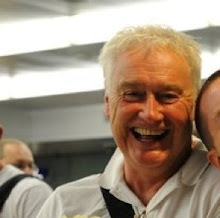I’m typing this at the desk of my friend, a NYU literature professor, in the study of her 3000sq ft apartment watching tiny flakes of snow dress the back gardens of some low rise but high end white brick mansions here on the Upper East Side. I feel extraordinarily privileged.
I also feel extraordinarily privileged to have been in at the beginning of something great on Broadway. Hot off the plane on Wednesday afternoon I scored a brilliant centre stalls house seat for the soon-to-open ‘Catch Me If You Can’, the musical by the creators of 'Hairspray' made on the back of the successful Leonardo di Caprio movie about the life of serial and successful con-man Frank Abagnale who eventually parlayed his capture and arrest into an almost equally lucrative career as fraud advisor to the FBI.
Funnily enough, on the plane I’d read a Vanity Fair snippet of an article by Abagnale himself about how proud he was to have been impersonated by both di Caprio and the star of CMIYC on Broadway, Aaron Tveit.
I’ve swooned over Tveit before, a couple of years ago when ‘Next to Normal’ blew me away as the most original modern piece to hit town since Rent, and although his presence lit up the stage and his effortless rock voice carried the best tunes, as the imaginary son of Alice Ripley’s character, he wasn’t the lead.
Then he may have been a counter hand but now, he’s bought the store and owns the stage too. Never before have I seen such a big show carried on the shoulders of such a young man. The structure of CMIYC begins with Frank’s arrest at Miami International Airport by his reluctantly-admiring nemesis Lt. Carl Hanratty in a multi-dimensional performance by Norbert Leo Butz that paired with Tveit’s extraordinary winning presence cannot help but put you in mind of Leo and Max from The Producers. It continues as though Frank is the impresario of a big-production TV show, and demands his constant presence on stage.
Not for a second in two and a half hours does his confidence or concentration lapse, and he carries 2500 people in the audience with him every step of the way. Even those who are jet-lagged from a tube journey on which someone died and the points failed, an urgent 90 quid taxi dash to Heathrow, seven weird hours in the hands of British Airways sitting across the aisle from a client I sued this time last year, and the unusually disjointed world vision of a Bangladeshi taxi driver.
For this show, and this young man, I’d have swum here.
Thanks to everyone who joined Erin Kelly, Melanie McGrath and me at
Mansfield Central Library on Saturday 25 February.
We had a panel discussion and Q&A, ...




